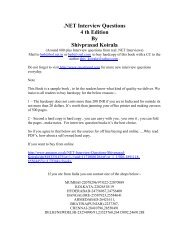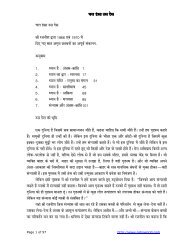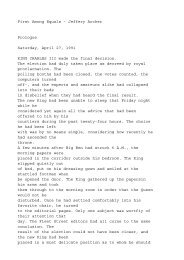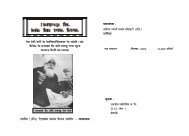- Page 1 and 2: Beware of duplicate interview quest
- Page 3 and 4: Titles written by Shivprasad Koiral
- Page 5 and 6: From the Author First thing thanks
- Page 7 and 8: The Table of contents is different
- Page 9 and 10: What is NTILE()? ..................
- Page 11 and 12: What are basic methods of “Dataad
- Page 13 and 14: How can we import and export using
- Page 15: (DB)How can we remove the Fragmente
- Page 19 and 20: √ This book goes in best combinat
- Page 21 and 22: un through those surprising questio
- Page 23 and 24: 56 Figure :- 0.1 IT Company hierarc
- Page 25 and 26: √ When it comes to maintenance pr
- Page 27 and 28: √ Do not mention your salary in C
- Page 29 and 30: √ Are you looking for onsite oppo
- Page 31 and 32: 64 1. Database Concepts What is dat
- Page 33 and 34: Many DBMS companies claimed there D
- Page 35: 68 database vendors where providing
- Page 39 and 40: 72 Figure 1.3:- Client Server Archi
- Page 41 and 42: 74 √ There are lots of third part
- Page 43 and 44: 76 defined types can now be written
- Page 45 and 46: 78 √ Query analyzer is now replac
- Page 47 and 48: 80 √ One-to-many Figure 1.5 : - O
- Page 49 and 50: 82 Figure 1.7 : - Many-to-Many Rela
- Page 51 and 52: 84 Figure 1.10 :- Normalized custom
- Page 53 and 54: (DB) Can you explain Fifth Normal F
- Page 55 and 56: 88 Twist: - What’s the relationsh
- Page 57 and 58: 90 Figure 1.18 : - MDF and LDF file
- Page 59: (DB)Can we have a different collati
- Page 62 and 63: INSERT INTO ColorTable (code, color
- Page 64 and 65: LEFT OUTER JOIN Left join will disp
- Page 66 and 67: What’s the difference between DEL
- Page 68 and 69: Figure 2.3 : - “_” operator in
- Page 70 and 71: Figure 2.5 : - Union All in action
- Page 72 and 73: DECLARE provincecursor CURSOR FOR S
- Page 74 and 75: Figure 2.7 : - Key Set Data DYNAMIC
- Page 76 and 77: What is ROLLUP? Figure 2.9 : - Grou
- Page 78 and 79: What is CUBE? Figure 2.11: - Subtot
- Page 80 and 81: inner join sales.salesterritory on
- Page 82 and 83: Figure 2.16: - WITH TIES in action
- Page 84 and 85: Select * from PURCHASEORDERHEADERCT
- Page 86 and 87:
What is UNPIVOT? It’s exactly the
- Page 88 and 89:
What is NTILE()? Figure 2.21 :- DEN
- Page 90 and 91:
√ If there is an error in UDF its
- Page 92 and 93:
Assembly_files system tables have t
- Page 94 and 95:
go EXEC sp_configure 'clr enabled'
- Page 96 and 97:
Safe Access sandbox This will be th
- Page 98 and 99:
What is Syntax for creating a new a
- Page 100 and 101:
so that .NET threads do not consume
- Page 102 and 103:
Following are the checks done while
- Page 104 and 105:
Are two version of same assembly al
- Page 106 and 107:
Note: - If the assembly is referenc
- Page 108 and 109:
So what does that mean? Well if you
- Page 110 and 111:
But for “out” types of paramete
- Page 112 and 113:
Let start step1 go to visual studio
- Page 114 and 115:
You can see in the below figure you
- Page 116 and 117:
After deploying the solution you ca
- Page 118 and 119:
Figure 3.16 :- Function source code
- Page 120 and 121:
There are two types of triggers :-
- Page 122 and 123:
ALTER PROCEDURE ps_NonFatal_INSERT
- Page 124 and 125:
√ Data Adapter (This object acts
- Page 126 and 127:
√ ExecuteNonQuery :- Executes the
- Page 128 and 129:
objOLEDBCommand = New OleDbCommand(
- Page 130 and 131:
ADO.NET provides the SqlCommand obj
- Page 132 and 133:
Third step is to create the Adapter
- Page 134 and 135:
RemoveAt Remove’s a “DataRow”
- Page 136 and 137:
Relation’s can be added between
- Page 138 and 139:
√ Commit or roll back the transac
- Page 140 and 141:
√ Subscriptions: - Subscriptions
- Page 142 and 143:
Figure 5.3 : - Detail architecture
- Page 144 and 145:
using Microsoft.SqlServer.Notificat
- Page 146 and 147:
6. Service Broker What do we need Q
- Page 148 and 149:
√ Further you have to assign thes
- Page 150 and 151:
GO -- Create Message contract what
- Page 152 and 153:
Figure 6.3 : - Output of the above
- Page 154 and 155:
7. XML Integration Note: - In this
- Page 156 and 157:
What is a valid XML? If XML is conf
- Page 158 and 159:
' After you have created the schem
- Page 160 and 161:
SELECT * FROM xmltable WHERE TestXm
- Page 162 and 163:
BATCHES = ENABLED, WSDL = DEFAULT,
- Page 164 and 165:
Twist: - What is Star Schema Design
- Page 166 and 167:
the dimension table and all other t
- Page 168 and 169:
Transformation:- This process can a
- Page 170 and 171:
Figure 8.6 : - Data Warehouse and D
- Page 172 and 173:
Figure 8.7 : - After executing BCP
- Page 174 and 175:
Once you have changed the FMT file
- Page 176 and 177:
√ Using BCP and Bulk imports we c
- Page 178 and 179:
√ Transactions are mainly batch t
- Page 180 and 181:
and ROLAP. However, unlike MOLAP an
- Page 182 and 183:
(DB)What is MDX? MDX stands for mul
- Page 184 and 185:
While data is loading in database
- Page 186 and 187:
√ Requirement phase: - System Req
- Page 188 and 189:
Figure 8.16 : - NorthWind Snapshot.
- Page 190 and 191:
Figure 8.19 : - Select Analysis Ser
- Page 192 and 193:
After that its time to define view.
- Page 194 and 195:
We had said previously fact table i
- Page 196 and 197:
This screen defines measures. Figur
- Page 198 and 199:
Figure 8.29 : - Deploy Solution Fig
- Page 200 and 201:
Figure 8.33: - Final look of the CU
- Page 202 and 203:
Figure 8.35: - Product Sales by cou
- Page 204 and 205:
on number of tickets sold , but if
- Page 206 and 207:
Figure 8.36 : - Data mining life Cy
- Page 208 and 209:
Based on the above data we have mad
- Page 210 and 211:
Figure 8.40 : - Bayesian Sample Dat
- Page 212 and 213:
Figure 8.41 : - Artificial Neuron M
- Page 214 and 215:
You can see neuron has calculated t
- Page 216 and 217:
√ Microsoft Decision Trees Algori
- Page 218 and 219:
Figure 8.46 : - Data mining and Dat
- Page 220 and 221:
9. Integration Services/DTS Note: -
- Page 222 and 223:
Figure 9.3 : - Specify the Data Sou
- Page 224 and 225:
Next step is to specify option from
- Page 226 and 227:
Figure 9.7 : - Successful execution
- Page 228 and 229:
√ Container: - Container logicall
- Page 230 and 231:
√ Whenever “Bonus” field is n
- Page 232 and 233:
Data Flow: - Data flow say how the
- Page 234 and 235:
Figure 9.19 : - Connection Manager
- Page 236 and 237:
Figure 9.22 : - Specify Connection
- Page 238 and 239:
Figure 9.25 : - Specify Destination
- Page 240 and 241:
Note: - You can see various data fl
- Page 242 and 243:
Reporting Server In big multi-natio
- Page 244 and 245:
Figure 10.2 : - Publisher, Distribu
- Page 246 and 247:
√ Read-only data are the best can
- Page 248 and 249:
Figure 10.4 : - Merge Replication M
- Page 250 and 251:
Figure 10.5 : - Transactional Repli
- Page 252 and 253:
Figure 10.8 : - Specify Type of rep
- Page 254 and 255:
Figure 10.12 : - Replication in Act
- Page 256 and 257:
Figure 11. 1: - Welcome reporting s
- Page 258 and 259:
Figure 11.3: - Specify provider Aft
- Page 260 and 261:
Figure 11.5 : - SQL Query Figure 11
- Page 262 and 263:
Figure 11.8 : - Final view of the r
- Page 264 and 265:
“Reporting Services” is not a s
- Page 266 and 267:
12. Database Optimization What are
- Page 268 and 269:
Figure 12.2 : - Page split for Inde
- Page 270 and 271:
Figure 12.3 : - Clustered Index Arc
- Page 272 and 273:
If we make non-clustered index on a
- Page 274 and 275:
DECLARE @ID int, Note: - Before rea
- Page 276 and 277:
Extents Scanned The number of exten
- Page 278 and 279:
Speed issues occur because of two m
- Page 280 and 281:
Figure 12.12: - sp_updatestats in a
- Page 282 and 283:
Figure 12.13 : - Create New Trace F
- Page 284 and 285:
In order to go to “Database Tunin
- Page 286 and 287:
√ Start performing analysis on al
- Page 288 and 289:
Figure 12.22 : - Reports by Advisor
- Page 290 and 291:
Figure 12.24 : - Largest Cost Query
- Page 292 and 293:
Nested Join If you have less data t
- Page 294 and 295:
Nested joins best suited if the tab
- Page 296 and 297:
13. Transaction and Locks What is a
- Page 298 and 299:
Brushing up the syntaxes To start a
- Page 300 and 301:
Figure 13.3: - Locking implemented
- Page 302 and 303:
√ Step3:- While “Mr. X” is vi
- Page 304 and 305:
√ Step3:- “Mr. X” wants to en
- Page 306 and 307:
the “Update” locks to “Exclus
- Page 308 and 309:
√ Bulk Update locks:-Bulk Update
- Page 310 and 311:
What are “Lock” hints? This is











